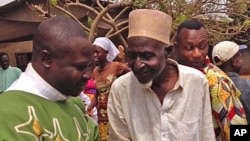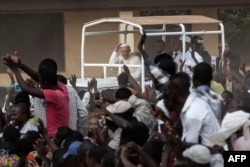The Rev. Justin Nary opened his gate to nearly 800 Muslims threatened with death from the roving gangs of Christian militia fighters who even threatened to burn his church down. Nearly two years later, more than 500 of the displaced are still living there in fear of going home.
While Pope Francis' message of peace and reconciliation during his landmark visit to Central African Republic was warmly received at the cathedral and mosque alike, the hard work of reuniting communities still lies ahead if there is to be lasting change in this country where nearly 1 million people have been forced from their homes.
The Muslims who live on the grounds of Nary's church may now venture out occasionally into town, though they always return at night because of the precarious security that still reigns, he said.
“Reconciliation is a process because it requires hearts to change,” Nary said. “It is not automatic but we will take the steps. And it will take time.”
The danger that remains was highlighted Tuesday with the news that one of the Muslim men who followed the pope out of the neighborhood was shot in the head and killed by a Christian militia, residents said Tuesday.
Christians and Muslims had long lived together in Central African Republic, where it was not hard to a find an interfaith couple before a political crisis erupted in early 2013 when Muslim rebels overthrew the Christian president and committed atrocities. By the end of the year, an armed militia opposed to the rebels attacked the capital, setting into motion the worst sectarian violence the country had ever seen.
The origins of the conflict stem from political disputes, not religious ideology. And yet the attacks of 2014 clearly targeted religious symbols: Dozens of mosques were destroyed and leveled to the ground.
Peace has only come through separation by force: Nearly all of Bangui's Muslims have fled to the country's north or beyond to neighboring Cameroon and Chad after coming under brutal attacks. Untold thousands have died and left behind relatives wary of living among those of other faiths: The brutal reign of the Muslim rebel government for most of 2013 provokes painful memories for many Christians.
One enormous question looms: Will the anti-Balaka fighters who identify as Christian heed the call of Pope Francis? Nary said many of the militants who have threatened Muslims in his community are not faces he had ever seen at Mass before.
And in communities where people already have fled for their lives, can there even be reconciliation if no Muslims remain?
The Rev. Brice Nainangue from Bossemptele also helped shelter hundreds of Muslims at the height of the crisis along with his colleague, the Rev. Bernard Kinvi after anti-Balaka fighters killed more than 80 people. Eventually most of the Muslims were escorted out by armed peacekeepers though a handful of orphans left behind remain under their care.
“All the hearts are not yet open to the path of reconciliation. There is some resistance but what reassures us are the gestures that we do see on the part of others,” he said.
While the mosques in Bossemptele have been razed to the ground, one imam has stayed behind and has managed to live in peace, Nainangue said. Time will tell whether other Muslims will return. In the meantime he said he is working to remind parishioners they must learn to live alongside their adversaries.
Organizations such as Catholic Relief Services are working to implement “social cohesion” programs in the areas torn apart during the conflict. Part of that includes helping to heal traumas and eventually will include building bridges between the affected communities, though for the moment in most areas there are no Muslims left to bridge with, said LeAnn Hager, the country representative for CRS.
In Bangui where Francis visited both Christian and Muslim displacement camps, there were early signs of a calm taking hold though it is unclear how long that will last. Hundreds of Muslims who had been blockaded inside their neighborhood since a resurgence of fighting two months ago jubilantly followed the pope out of the area to the center of the capital Monday.
In a euphoric moment, some even shouted “the war is over!” Following the killing of at least one Muslim who was shot dead by anti-Balaka, community leaders quickly called for calm and urged Muslims not to retaliate.
“Perhaps the pope's visit will be a blessing for Central African Republic,” said Mohamed Ali Fadoul, the president of a self-defense group in the PK5 neighborhood. “Leave us in peace. That is enough.”
Reports of gunfire and fighting have diminished around the pope's visit though it remains to be seen whether those gains will last.
Mbolissa Panphile, a 36-year-old electricity worker and father of two, expressed a remarkable sympathy for the Muslims blockaded into PK5 by the Christian militia as he sat in the stadium for Pope Francis' final Mass.
“It's what we want on both sides, Catholic and Muslim. We can't continue this,” he said. “If a man of God has risked his life to leave his country and come to Central African Republic for peace, this is very important. We must take Pope Francis' initiative.”
In a particularly hopeful sign, already some of those pledging peace are the very ones who have lost the most, who must struggle each day to accept a future without their slain loved one.
Dominique Lonzia and his wife, Edorcie, are still grieving the death of her sister, who died in a grenade attack launched by Muslim rebel fighters. Yet while leaving the stadium after the pope's Mass on Monday, both said they were committed to forgiveness no matter how difficult.
“At this moment when the pope has come here, we are going to forget, we are going to forgive all those who have hurt us,” he said.
“Yes we will forgive people - even though my sister had four children,” his wife agreed, then taking a long pause. “We will forgive them because of the Lord.”





